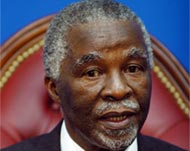Poor attendance mars African summit
African leaders have undermined a regional summit being held in Egypt discussing better governance on the continent, by not attending the talks.

The summit on Tuesday was expected to kick off in the Egyptian Red Sea resort of Sharm al-Shaikh without South African President Thabo Mbeki and Senegalese President Abdoulaye Wade, two of the four-year-old body’s founding members and driving political forces on the continent.
The poor attendance was a blow to the New Partnership for Africa‘s Development (Nepad), as the continent’s homegrown plan for development was created with the aim of attracting private investment in return for evidence of improved governance.
Nepad is still reeling from the scathing comment made at last year’s summit by Wade. “I have great difficulties explaining what we have achieved when people at home and elsewhere ask me that question,” he had said in Johannesburg.
He said nothing had been achieved in eight key sectors, including health, agriculture, education, infrastructure, information technology and telecommunications as well as science and technology.
Meanwhile, opening speeches by Egyptian President Husni Mubarak and his Nigerian counterpart Olusegun Obasanjo were expected to focus on a plea for financial assistance, as the fledgling body struggles to spread its wings.
More aid needed
The report to be presented to Nepad members at the summit stresses that the continent would need another $50 to $75 billion in aid if it were to reach the United Nations’ millennium goal of reducing global poverty by half by the year 2015.
 |
|
Mbeki was one of many African |
The report asked Nepad’s steering committee to urge the Group of Eight leading industrialised countries in the world to double aid in the short term and improve its coordination and distribution.
The current level of funding for Nepad stands at $10 billion a year for cross-border infrastructure projects and the same amount to speed up the streamlining of African institutions.
The report urged the G8, whose next meeting is scheduled for July in Scotland, to propose a timetable for scrapping subsidies to specific countries and offer a mechanism enabling African products to penetrate the European market.
Deliver pledges
Nepad also urged rich countries to deliver on their pledge to devote 0.7% of their GDP to African aid, write off some $185 billion in debt and convert loans into donations.
|
“Poverty is currently the main obstacle development is facing in Africa“ Nepad report |
“Poverty is currently the main obstacle development is facing in Africa,” the document stressed.
A study by the Switzerland-based World Economic Forum last year said most sub-Saharan countries were worse off economically today than they were directly after decolonisation.
Per capita gross domestic product (GDP) in sub-Saharan Africa today is $200 lower than in 1974, it said.
In its assessment of activities over the past year, Nepad nevertheless hailed some achievements, including in the field of technological development.
Improving relations
Meanwhile, on the sidelines of the summit, the Egyptian, Ethiopian and Sudanese presidents held their own meeting, Aljazeera reported.
Hussain Abd al-Ghani, director of Aljazeera’s office in Egypt, said a series of meetings had been held between the countries over the past three years to forge better relations.
The meeting is expected to result in an open tripartite regional gathering, considered the biggest in eastern Africa.